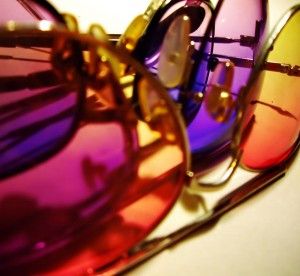But that UV exposure can be seriously damaging for eyes. The immediate effects include majorly painful sunburn on the sensitive skin around the eyes, but serious long-term effects like skin cancer and damaged vision are also a concern. Plus, anyone out and about in the snow or at higher altitudes will be catching even more UV rays. And unlike the skin, which needs some (repeat, some) UV exposure to synthesize vitamin D, the eyes have no need for sunlight.
The Takeaway: No matter the season, it’s important to wear sunglasses outside. Exposure to UV rays in the winter can contribute to skin cancer and vision loss.
Block It Out
Add another step to your UV protection arsenal: sun block. Even in the winter, sun block may be necessary — especially when spending time outdoors around snow and ice.
Fun Fact
In the northern hemisphere, the latitude that separates those who should wear sunglasses in the winter from those who don’t need to is the 45th parallel, which runs through the northernmost states in the U.S. (like Washington and Minnesota), France, and Romania.

